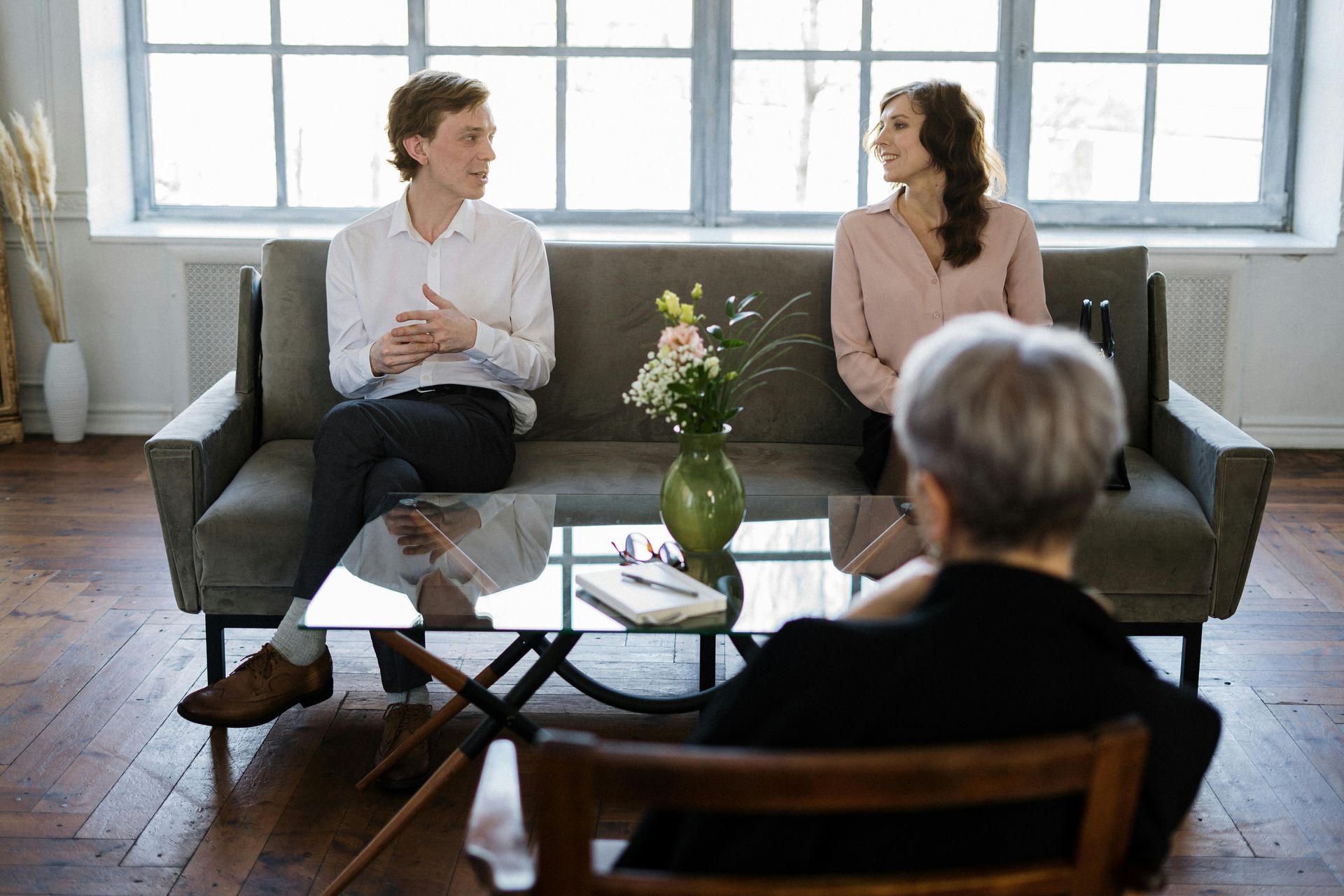Take Back your Marriage/Relationship
Kathleen Maiman • October 22, 2018

In our current culture, we live in a consumer society. If my car or outfit doesn’t meet my needs, then I discard it or trade it in for a new one. For many of us, we do the same thing in our marriages and relationships. We focus on getting our needs met and if that doesn’t work, then we conclude “We are not compatible”, “I picked the wrong person”, or “There is someone better out there for me (ie someone more like me)”. This leads us to believe that our happiness depends on our marriage and our partner and if we are not happy, there is something wrong with either of them”. With these kinds of perceptions and attitudes, we come into relationships with expectations to have our partner make us happy and fulfill our needs. We believe we are entitled to it. This is quite the set up!
Our culture also thrives on improvement and bettering our status. So when the relationship isn’t turning out the way we expect it to be, we begin to make threats and gestures to ending it, finally withdrawing our efforts.
Where does this leave us in our society?
There are many families with kids coming from divorced parents or partners who now have had the infamous “starter marriage”. Being a cultural norm, partners discard one another early, accepting the notion of divorce, and hoping for a “happier version” in their next relationship.
As a result, people are moving into more complex and challenging situations such as co-parenting from different houses, thus impacting our sense of connectedness with each other, our kids and society. With this consumer mindset, what are we teaching our kids? What kind of relationship values are we holding for ourselves and society? (Please note: if there are ongoing affairs, abuse/violence and active addictions in a marriage/relationship….I am not suggesting partners stay together. These are catastrophic conditions for a relationship and are not sustainable or possible to thrive in. They often need a supportive intervention).
For the more common situations in marriages and relationships, there are many resources for partners/families to get help before calling it quits. Counselling in this era is much more prevalent and available. As well, there is an abundance of relationship educational and experiential workshops and retreats. Decades before, one would stay married or together because of financial reasons or dependency reasons. Staying together for the kids was another common reason. All the while, knowing that the parents were staying together for the kids, the house was full of resentment and tension. Today many parents remember these feelings they felt growing up in their tension-filled family homes, and want nothing to do with this. So, with the first sign of discontent, adults quit early as they are capable of having their own careers and managing their finances.
So, back to getting married. “Why do we get married”? For many of us, it is the Consumer Attitude. We get married to have someone make us happy! When folks have this mindset, they give up when the going gets tough, often done prematurely without seeking appropriate help. Research says that people will call a divorce lawyer before speaking to a marriage counsellor and will typically not go to a marriage counsellor for an average of 6 years. They utilize their own angles and strategies on their own with its inherent defaults. For some, they might get the courage to enter into individual counselling. Now, having someone who is biased for them and receiving validation for their feelings, it confirms their desire to leave and the status quo, “I should be happy”.
What is often necessary and scarier for couples is admitting the pain in the marriage and entering into a marriage counselling office. Many will do when they are “one foot” out the door, thus boasting “we tried marriage counselling”. Being a short lived experience, the results are of little benefit due to the lack of commitment at looking at their own perceptions of marriage and changing themselves.
So what are some of reasons that people give for the downfall of their marriage. We grew further and further apart! Well, I see this as a consequence of society and our misguided focus. We put more effort into our kids’ activities, our job performance and success, our fitness and bodies, ipads and smartphones, Facebook and Instagram; all at a cost of having less time and focus on our relationship. When we do show up at the end of all it, we are exhausted after giving so much to our jobs and kids, outside endeavours, and have little for the other. Then the stance: “what can you do for me”? Frustration in both partners builds. Both feeling unfulfilled in having their needs met in conjunction with the expectations on the other to fulfill those needs, we turn towards “outside” pleasures: Netflix, Facebook or an attractive member of the opposite sex. Thoughts may stir towards leaving the relationship…“Surely there is someone else who wants to fulfill my needs” or “I will focus on getting my own needs met ….at least I can make myself happy”.
In other situations, couples create “in house separations” or “invisible divorces”. Their relationships lack emotional connection, understanding and empathy of each other. On the outside, they look like they are playing the part of togetherness while inside both parties are resentful and demoralized.
Could there be a remedy for all this unhappiness? Yes, take back your marriage or relationship”. Put the focus on: “what does your relationship need from each of you vs. what are we are not getting”.
One of the most difficult things for humans is change. To look at ourselves and change ourselves. Changing the other is futile and impossible. However, changing ourselves may include changing the perception of the situation/other, and our attitude and behaviours. If one takes the focus off what the other is doing or not doing and looks inward at our own contribution to the demise or care of relationship, we might discover something. How safe of a partner am I? Do I turn away from my partner when they are in distress? How loved/cared do I make my partner feel? Do I look for things wrong with my partner versus what is right? Do I offer my love and appreciation in the form of declarations and affection or do I keep protected and guarded waiting for them to show up and initiate a bid for connection? Do I reveal what is really important or do I shove it under the carpet?
I often see couples falling into a dynamic that is easily treatable with awareness and change. The pursuer-distancer dynamic is very common in couples. When either party becomes distressed, one may retreat to soothing themselves and protecting their vulnerability and the other may pursue with demands, hoping to have their contact needs met – also covering up their vulnerability. In order to be in relationship, focusing on what we can change is the key to success, versus waiting for the other to change. Perhaps taking an emotional risk and verbalize, “I feel sacred when you move away from me” or “I feel overwhelmed and ashamed when you criticize me”. If the other is invested and committed to looking at what they bring to relationship and offering a safe, secure base, then he or she will respond with compassionate engagement. This correction in the dance of intimacy can be the crucible moment for a couple to return to a place of connection and safety.
Hence, learning about oneself and discovering each other in relationship is what marriage and relationship provides. Becoming a safe place for each other to grow into maturity without threats of leaving and divorce can foster a place of learning and growth. Moving from expectation and entitlement to curiosity of what your relationship needs is the first step to seeing what is possible. Take back your marriage or relationship means to look at it with “new eyes”, moving from the “Me to We”.
Register for our Newsletter and receive a Free Love Chat Package
This Package Includes
- The 5 Steps to a Better Relationship
- Ongoing Monthly Relationship Tips
- If you want more love in your life, our relationship Love Chat Package is an easy cost-free first step.

There are many highlights with the 2026 Olympics in Milan this winter. One of my favourites is the Ice Dancing Pairs. Watching them pursue the Olympic gold as a couple is breathtaking to watch. They are two people gliding across the ice as if they share one heartbeat. Every lift, every turn, every daring leap relies on

Every February, couples across the world brace themselves for Valentine's Day, sometimes with excitement, sometimes with dread. While the day can invite sweetness and connection, it can also stir up pressure, disappointment, or quiet resentment. As a couple’s therapist, I often see Valentine’s Day magnify whatever is already humming beneath the surface of a relationship: intimacy, disconnection, hope, or longing.

The holidays can bring out the best and the worst in us. Between travel plans, family expectations, and endless to-do lists, even deeply connected couples and individuals can feel stretched thin. While this season promises joy and closeness, it also tests patience, communication, and self-care. Taking it easy—both with yourself and your partner and loved ones —can make all the difference.

In today’s digital world, screens have woven themselves into every moment of our lives. From the first scroll in the morning to the last glance before sleep: our phones and tablets are shaping how couples are spending time together. Just have a look the next time you go out to dinner and see the couple both sitting on their phone while waiting for their dinner to arrive. While this technology connects partners across distances, it can also subtly erode emotional intimacy when left unchecked. You are not alone if you’ve ever tried to talk to your partner while their eyes are glued to a glowing screen. In today’s world, screen time has quietly become the “third wheel” in many relationships.

When we first meet, we are the best version of ourselves. We take care of ourselves and show up as our best self. In the first few weeks and months of a relationship, we are on our A game. We dress up, plan dates, show up, have fun, we listen and we are in a good mood and say yes to new experiences and adventures. We a












